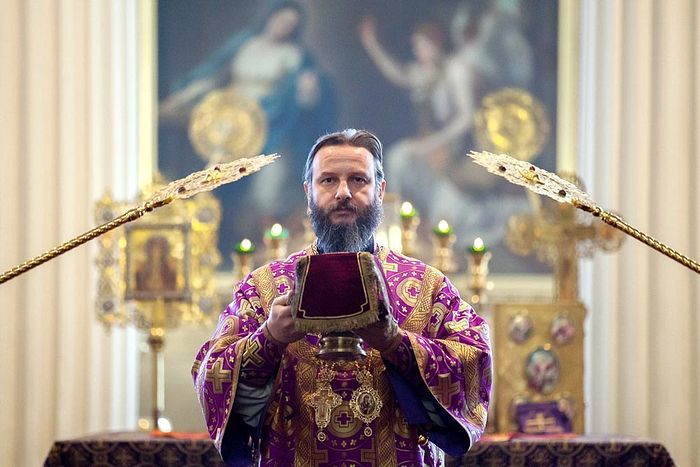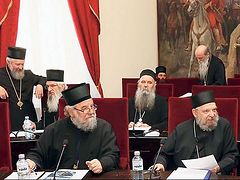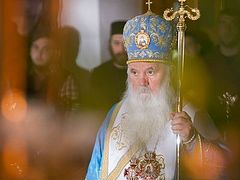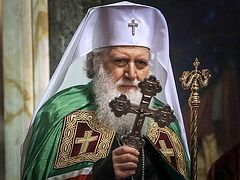Ohrid, North Macedonia, August 14, 2019
At its May session, the Council of Bishops of the Serbian Orthodox Church resolved to reopen the dialogue with the “Macedonian Orthodox Church” (MOC), a formerly autonomous body within the Serbian Church that departed into schism and declared itself autocephalous in 1967. The MOC remains unrecognized by any Local Orthodox Church.
However, as His Eminence Archbishop Jovan of Ohrid, a canonical hierarch of the Serbian Church serving in North Macedonia, states in a recent interview with Politika, the talks have stalled, through no fault of the Serbian Church. There are currently no direct contacts with any member of the MOC Synod of Bishops, Abp. Jovan said.
Negotiations were adjourned after the MOC did not accept the 2002 Nis Agreement that would have reunited the MOC with its Mother Church. Abp. Jovan, previously a bishop of the MOC, was the only hierarch to become canonical at that time. “At that time, the MOC did everything it could to neutralize the existence of the Orthodox Archdiocese of Ohrid, and even cut off any communication with the Serbian Orthodox Church (SOC),” Abp. Jovan explained.
Then the state became involved, which only made matters worse, the hierarch of the Serbian Church explained. Abp. Jovan himself became an object of persecution and was jailed several times for his canonical stance. He was finally released in 2015, though court proceedings against him have continued. But despite all this, Abp. Jovan explains, the SOC showed itself ready to restart the dialogues to finally resolve the problem of the MOC’s non-canonical status.
Besides the above, there is another obstacle today, according to Abp. Jovan: The MOC turned first to the Bulgarian Church to become its Mother Church and help it resolve its status, and then it turned to Constantinople itself, seeking autocephaly. “All of this, of course, delays the start of negotiations, because until it is clear that the MOC bishops will not sit in two chairs, it is impossible to begin negotiations.”
Furthermore, the appeal to Constantinople is meaningless, Abp. Jovan believes, as the Patriarchate has no competency to resolve inter-Church conflicts.
“Even if the Ecumenical Patriarchate were granted the right of appeal in some degree, this could only be done on an individual level, for example, if a person, with or without a Church act, felt he was disenfranchised in the Local Church where he was tried. The Ecumenical Patriarchate is not competent to resolve inter-Church disputes,” the hierarch of Ohrid explained.
“Only a great Church Council is responsible for this,” he continued, and if the Council decides in a manner not pleasing to the bishops of the MOC, they will continue to be schismatic, for many decades.
Regarding who has the right to get involved in the affairs of a Local Church, Abp. Jovan notes that although the MOC tried to involve the Bulgarian Church in its affairs, it did not accept the role of Mother Church precisely because that role belongs to the Serbian Church, and no other Local Church can interfere. The Macedonian state thought that its improving relations with the Bulgarian state would help to resolve the Church issue, “but this did not materialize because Church relations are independent of the state,” Abp. Jovan maintains.
And regarding the possibility of Constantinople interference in North Macedonia, Abp. Jovan notes that it was Constantinople that gave the Serbian Church jurisdiction over present-day North Macedonia, and therefore does not believe the Patriarchate will try to reenact the Ukrainian scenario there.
However, “after what happened in Ukraine, anything can be expected,” he added. Constantinople itself has sent mixed signals, sometimes announcing that it would solve the Macedonian issue, sometimes that it would leave the issue to the Serbian Church.
Furthermore, any notion of the primacy of power is unacceptable in Orthodoxy, though the Patriarchate of Constantinople does legitimately hold a primacy of honor, the Ohrid hierarch affirms.
“It is unacceptable that in the 21st century there would be only one Church, even were it the first-born, to decide for itself the issues of interest to other Orthodox Churches,” Abp. Jovan concluded.
Abp. Jovan previously called for a pan-Orthodox council to resolve the issue of schismatics in the Church.




